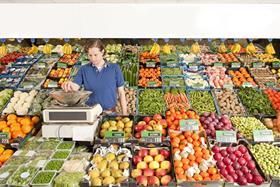
Greengrocers are enjoying a resurgence in fruit and veg sales thanks to anti-plastic sentiment from younger shoppers.
The displays of loose produce common in smaller grocery stores are appealing to new customers looking to lower their plastic footprint and support alternatives.
Following Sir David Attenborough’s Blue Planet II series, which finished at the start of the year, the food industry is making efforts to cut back on unnecessary plastic use, and switch to recyclable packaging options, in a trend dubbed “the Blue Planet effect”.
One of the main drivers of removing plastic from the supply chain is the support from millennials for more sustainably produced produce, according toThe Telegraph.
Grant Fox, owner of Seasons of England said: “We have loads of young customers. I would say [millennials] care about seasonal produce and their carbon footprint. A lot of our veg is from just 7 miles from where we are. 90 per cent of our plants aren’t wrapped in plastic - they’re all loose.
“You can't buy the produce we have here in the supermarkets - they don't sell the rainbow chard and artichokes...the varied produce we sell, a lot more seasonal produce.”
David Matchett, development manager at Borough Market said that millennials are also keener to connect with their food, as well as embrace higher value food.
'We've definitely seen an increase in millennials coming to buy fruit and veg at the market. They want to connect with their food and see where it comes from - greengrocers and markets can help with that.
“Millennials are interested in different sustainable diets so they come to ask our traders about it and can get informed. They really care about climate change and come here because we use minimal packaging, we also installed water fountains last year and banned the sale of bottled water.
'Food of a higher value is appreciated by this generation who are becoming more aware - you need personal contact with people who know about the food at the greengrocers or the market.”



